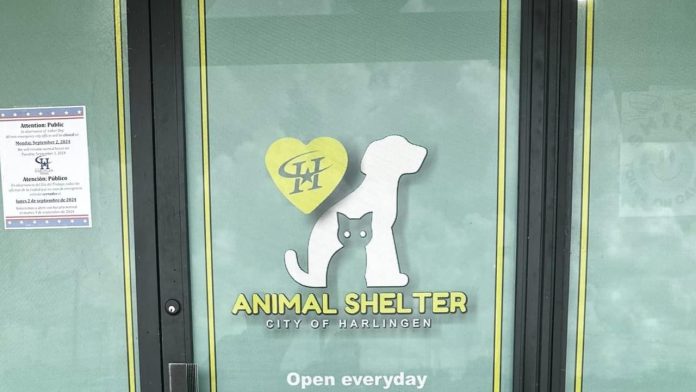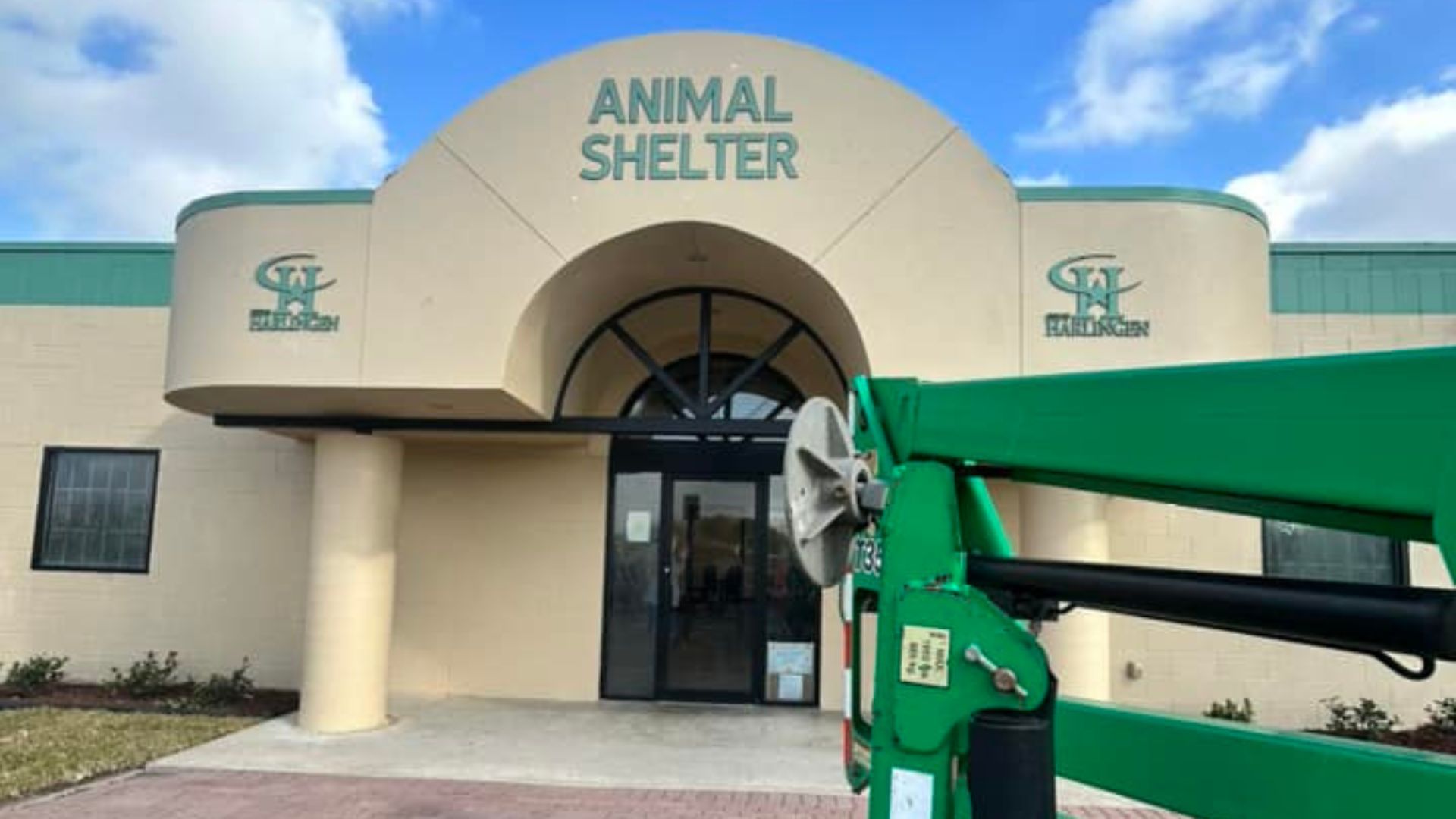
|
Only have a minute? Listen instead
Getting your Trinity Audio player ready...
|
HARLINGEN — Facing animal rights advocates’ condemnation of euthanasia rates, city officials are taking steps to better clean and disinfect the new Harlingen animal shelter following a distemper outbreak, while considering vaccinating dogs and cats before entering.
Last month, animal rights advocate Rudy Coronado, citing city records, told commissioners the shelter euthanized 203 out of 244 animals in the shelter in July.
That month, the shelter faced a distemper outbreak that led veterinarian Robert Kellogg to recommend euthanasia, Shannon Harvill, the city’s environmental health director overseeing the operation, said.
From February to July, records show the shelter euthanized 745 animals during the period in which it accepted 1,088 animals into the shelter.
On Thursday, the 4,340-square-foot shelter, with 33 dog kennels, 24 cat enclosures and five puppy runs, was at capacity, holding 65 dogs and 48 cats, Assistant City Manager Josh Ramirez said.
Now, Commissioner Daniel Lopez is calling on officials to update commissioners on their steps to better the shelter.
“This is a humane issue,” Lopez told Harvill during a meeting Wednesday. “We want to make sure we handle it in the best ethical, moral, fiscally responsible way we can and make sure we get a win for the animals, a win for the citizens, a win for the city. I would like the commissioners and the citizens to know it is a top priority for us, that we’re always looking to do better in every aspect.”
Lopez called on officials to put together “better programs and policies” at the shelter.
“How do we improve? Every day, how do we get better?” he asked Harvill. “I know you guys are working on that, Dr. Kellogg’s working on that.”
Lopez said officials didn’t give commissioners information regarding the shelter’s euthanasia rate.

“It’d be fair to say, I was a little thrown off when I first heard the numbers about the euthanasia,” he said. “I was unaware that it was to that level. I know you guys do work as hard as you can in the situation you’re in and I know you all are looking at updating your plans, programs, policies and protocols.”
During her presentation, Harvill told commissioners officials are working with Kellogg to better clean and disinfect the shelter following the distemper outbreak.
“Based on his recommendations, we’ve made changes to our cleaning protocols,” she said. “We’ve made changes to our disinfecting protocols.”
Now, officials are considering taking steps to deep-clean the shelter, Harvill said.
“Discussions are being held about maybe closing for a day or two — again, discussions — trying to do deep-cleaning,” she said. “This deep-cleaning would allow to help with any type of diseases that are going on, any illnesses, things of that sort.”
Officials are also considering vaccinating animals before they enter the shelter, Harvill said.
“We’re also talking about setting up appointments to drop off animals so that we could have vaccines ready so that as soon as that animal gets there, even before it comes in the building, we’re vaccinating it, again, in an effort to try to help prevent any type of illness or disease outbreak,” she said.
Based on Kellogg’s recommendations, the shelter euthanized animals “for medical reasons,” Harvill said.
“We’ve worked very closely with Dr. Kellogg,” she said. “We’ve worked to address the upper-respiratory condition.”
In July, the animal shelter euthanized more than 120 out of 197 animals accepted, while euthanizing more than 100 and accepting 92 animals in August, she said, adding it euthanized 80 to 100 out of 157 animals accepted in September.
“Those medical reasons can vary depending on the individual animal,” she told commissioners. “The veterinarian that we have contracted with, who has over 40 years of experience, evaluated those animals and based on his experience, based on different factors, we referred to his expertise in that and went with what he felt was in the best interest and most humane for that animal for those medical conditions. We’re never going to question a licensed veterinarian’s recommendations.”
Harvill described the shelter as “stretched to its limits.”
“The animal shelter is only so big. It can only take in so many animals,” she said. “Every single day, the animal shelter operates at its capacity for care. There’s not a day that goes by that they have even three or four open kennels to take in animals, because they operate at that capacity for care every day.”
During the meeting’s public comment period, resident DawnRae Leonard told commissioners the shelter’s euthanasia rate stood as “a proverbial black eye for Harlingen,” while blaming what she described as “mismanagement.”
“Our tax dollars are being used to destroy a massive amount of animals, in spite of strong opposition to the practice,” she said, adding the shelter euthanized 203 out of 244 animals “under the guise of distemper” during June and July. “This kill shelter will be your legacy.”
From the podium, Leonard argued distemper’s a “treatable” condition.
“For your information, distemper is not curable but it certainly is treatable,” she told commissioners. “The protocol for distemper does not necessarily call for euthanasia and it can be carefully managed in a shelter setting.”
Since February, the shelter’s euthanized about 1,000 animals, Leonard said, comparing the operation to the Rio Grande Valley Humane Society, which ran it as a so-called “no-kill” shelter for about five years.
“The Humane Society had a save rate of 92%,” she said. “The city has a kill rate of approximately 77%, and it could be higher.”
Leonard called on commissioners to “resolve to return the shelter operation to the Humane Society so that they will provide services to care for the health and safety of the animals.”
In January, city officials took over the shelter after the Humane Society, operating what it described as a “no-kill” shelter, stopped accepting residents’ animals, Ramirez said.
To jump-start operations, commissioners pulled $365,937 from the city’s general fund budget to foot the payroll for an 11-member staff, with Harvill overseeing the operation.
A month later, commissioners entered into a $1,248 monthly contract with Kellogg, who co-founded the Humane Society during his 40-year career.
Since then, commissioners have funded requests including the purchase of a $38,360 animal transport van and a $900 computer software program while hiring a second animal adoption coordinator at a salary of $40,771 with benefits.
For months, officials have been planning to draw grant money to build a bigger animal shelter.



